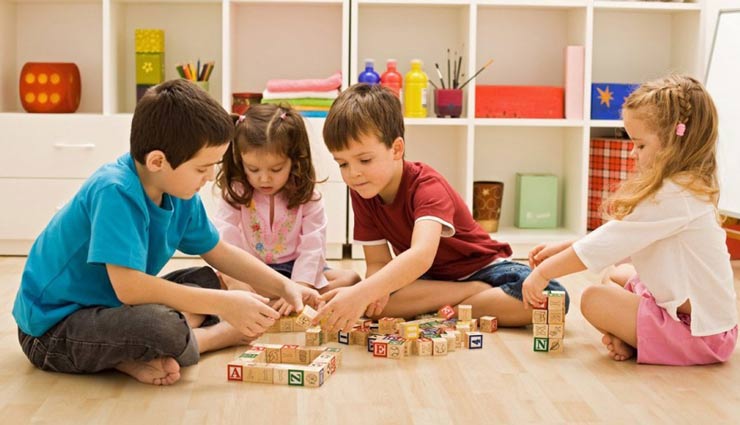Prepare for Kindergarten (Ages 4-5)
As your child enters the preschool stage, they begin to assert their independence and develop social skills by interacting with others. This period marks their entry into the school community, signifying increased time away from home. While they may start questioning your instructions, they're now at an age where they can comprehend explanations for rules. To support you in being the best parent or caregiver during these crucial years, we've compiled some tips to aid in your child's growth and development.
Preparing Your Child for Kindergarten:
Being your child's first teacher is a significant role in setting them up for success in school and life. The time you spend with your child at home is valuable. There are simple and enjoyable activities you can engage in to better prepare your child for kindergarten. We've provided ideas to make this preparation process fun for both of you.
Enrolling in Kindergarten:
Whether it's your first child entering kindergarten or you've been through it before, there's essential information to ensure a smooth enrollment process. We've gathered everything you need to know, including kindergarten eligibility, enrollment procedures, required paperwork, available options, and more.
Additional Tips:
- Clearly and consistently communicate expectations when disciplining your child. Provide explanations and demonstrate the desired behavior. Instead of just saying "no," explain what they should be doing.
- Limit screen time to one to two hours a day. Excessive screen time is linked to obesity and behavioral issues in children.
- Monitor your child's media consumption. Content featuring violence or aggression can frighten preschoolers, leading to nightmares or aggressive behavior.
- Offer your child a limited number of simple choices, such as selecting outfits, deciding on games, or choosing snacks.
15 Daily Activities (Ages 0-3)
The first three years of your child's life are super important for their growth, and we know it can be a busy time for you as a parent. But here's the good news – there are easy things you and anyone taking care of your child can do every day to make their future brighter. Lots of regular stuff you do, like getting dressed or doing chores, are fantastic chances for you and your child to bond and learn together. Let's check out 15 simple things you can easily fit into your daily routine to create awesome learning moments for your child from the day they're born until they turn 3. These activities cover four essential areas: talking and understanding, thinking, social skills, and emotions.
1. Listen to Your Baby:
Pay attention to how your little one communicates. Even if they can't use words yet, they express themselves through sounds and expressions. Let them know you're listening by looking at them, nodding, picking them up, or chatting with them.
2. Repeat Sounds and Words:
Have back-and-forth talks with your child. This helps them learn and improves their communication skills for later.
3. Read, Sing, and Tell Stories:
Sharing books, songs, and stories helps your child understand new words and ideas. Pointing to pictures while reading helps them connect words to objects, and singing makes learning sounds and language patterns fun.
4. Talk About What You Do Together:
Whether you're playing, shopping, or folding laundry, chatting about what's happening helps your child understand words and boosts their communication skills.
5. Play with Toys in Different Ways:
Interacting with toys in various ways, like touching, stacking, or shaking them, helps your child develop muscles and senses.
6. Turn Activities into Learning:
Make daily tasks, like dinner or bath time, into opportunities to explore colors, textures, and tastes.
7. Encourage Their Interests:
Pay attention to what your child enjoys the most, as they learn better from activities that excite them.
8. Ask Questions:
Get your child thinking by asking questions. For example, when reading a book, ask, "Where is the doggie?" or "Which balloon is red?"
9. Talk About Feelings:
Help your child express their emotions by talking about what they're feeling. This helps them understand and share their emotions better.
10. Let Toddlers Make Choices:
Offer simple choices to help your child learn decision-making skills, like choosing when to eat a snack.
11. Stay Calm During Upset Moments:
When your child is upset, staying calm helps them feel safe and in control, teaching them to handle their emotions.
12. Give Positive Comments:
Praise your child when they do something well. This boosts their confidence and encourages them to try new things.
13. Encourage Problem-Solving:
Support your child's problem-solving skills without solving everything for them. Let them figure things out with your encouragement.
14. Let Them Do Things Themselves:
As they grow older, let your child try things independently, fostering a sense of accomplishment and independence.
15. Encourage Perseverance:
Remind your child that it's okay not to get things right the first time. Encourage them to keep trying with positive words like, "You're working so hard. You'll get it. Sometimes it takes a lot of tries!"
Tips for Toddlers (Age 1-3)
Entering Toddlerhood: A Guide to Support Your Little Explorer's Growth
When your baby turns into a toddler, it's like a whole new world of energy and discovery. They start moving more, becoming social butterflies, and expressing themselves in different ways. This is a fun and crucial time for both your child and you, as their personality begins to shine through, and they soak up knowledge like sponges.
Building Language Skills:
- Encourage your toddler to try out new things and play with different stuff.
- Make reading a regular thing; it's not just for bedtime.
- Play simple games like sorting shapes and puzzles to help their brains grow.
- Explain things in simple terms so they can understand.
- Let them use their imagination in play; it's good for their creativity.
- Try games where they follow your lead or pretend you're having a parade.
- When your toddler says a word, add more words to what they're saying. For example, if they say "dada," you can say, "Yes, you're right, that's daddy."
Nurturing Curiosity and Independence:
- Ask your child to find things or name body parts at home.
- Explore things together during walks or bus rides to make learning fun.
- Let them help with getting dressed or feeding themselves.
- Praise good behavior more than scolding, and use short timeouts if needed.
- Instead of saying they're a "bad boy" for doing something wrong, talk about the behavior. For instance, say, "Don't touch the hot stove; you could get hurt."
- Get them to tell you their name and age.
Encouraging Self-Expression:
- Sing simple songs together, like "Twinkle, Twinkle Little Star" or "Itsy Bitsy Spider."
- Don't give too much attention to tantrums; teach them better ways to show they're upset.
- Let them make choices, like picking a game or book.
- Offer them a few choices so they feel in control without getting frustrated.
- Allow them to figure things out on their own, stepping in only if it's necessary to keep them safe.
- Remember, accidents, like potty mishaps, are normal for toddlers. Just keep expectations in line with their age.
Why quality matters
The significance of quality in early childhood programs cannot be overstated, as highlighted by extensive research spanning three decades or more on child care and child development. Numerous studies conducted in various countries consistently emphasize the pivotal role of quality in child care, revealing its profound impact.
High-quality early childhood programs, such as child care, yield numerous benefits for children. Conversely, if the quality is poor, these programs may prove ineffective or even detrimental. This is particularly crucial for children who are vulnerable, at risk, or hail from inadequately resourced households.
Extensive research on older preschool-age children underscores the positive effects of participating in high-quality child care programs. Findings from this body of research strongly indicate that such programs contribute significantly to children's cognitive, social, intellectual, and language development.
While research on the impact of child care on children younger than two years old is limited compared to preschool-age children, a noteworthy concern arises regarding substantial hours spent in very early poor-quality child care. Although less conclusive, some research, encompassing both disadvantaged and non-disadvantaged children, suggests that high-quality child care programs initiated in infancy may be even more advantageous than those commencing later.
In summary, the overarching research consensus underscores the critical role of quality in early childhood programs for all children. Whether in terms of cognitive, social, or language development, the quality of these programs emerges as a key factor in shaping positive outcomes for children.
The most visited articles
Most visited articles for more user information
Why quality matters
The significance of quality in early childhood programs cannot be overstated, as highlighted by extensive research spanning three decades or more on child care and child development. Numerous studies conducted in various countries consistently emphasize the pivotal role of quality in child care, ...
15 Daily Activities (Ages 0-3)
The first three years of your child's life are super important for their growth, and we know it can be a busy time for you as a parent. But here's the good news – there are easy things you and anyone taking care of your child can do every day to make their future brighter. Lots of r...
Prepare for Kindergarten (Ages 4-5)
As your child enters the preschool stage, they begin to assert their independence and develop social skills by interacting with others. This period marks their entry into the school community, signifying increased time away from home. While they may start questioning your instructions, they'r...




